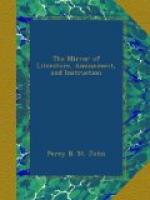[21] Archaeologia, vol. xx. p. 59.
Cut off for a long and tedious period from his crown and his people, James could afford to spend many hours in each tedious day of his captivity in the cultivation of accomplishments to which, under other circumstances, it would have been criminal to have given up so much of his time. And this will easily account for that high musical excellence to which he undoubtedly attained, and will explain the great variety of instruments upon which he performed. Besides, to use the words of a learned and amusing writer, it is well known that “music constituted a part of the quadrivium, a branch of their system of education, and it was more or less cultivated by persons of all conditions;”—churchmen studied it by profession; and the students at the Inns of Court learned singing and all kinds of music. Richard II. understood something of the practical part of it; for, on the day of his departure for Ireland, he assisted at divine service; with the canons of St. George, and chanted a collect. An old annalist, enumerating the qualifications of Henry IV., describes him as of shining talents in music [in musica micans]; whilst Stow says of Henry V., “he delighted in songs, meeters, and musical instruments."[22] These examples appear amply sufficient to defend King James from any imputation of over-refinement or effeminacy in the cultivation of an art which was the favourite amusement of such monarchs as Henry IV. and his illustrious son.
[22] Ibid pp. 60, 61.




